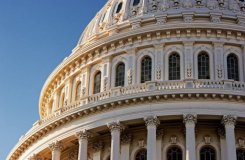 |
| © AFP/File Paul J. Richards |
WASHINGTON (AFP) – The US House of Representatives on Monday voted to extend controversial counter-terrorism surveillance powers at the heart of the Patriot Act adopted after the September 11, 2001 attacks.
With the three provisions set to expire February 28, lawmakers approved legislation to extend them to December 8 by a 275-144 margin, one week after defeating the proposal in a ballot requiring a two-thirds majority to pass.
The vote came amid a bitter battle over how long to extend the intrusive powers at the core of the signature legislative response to the terrorist strikes nearly 10 years ago, and with what safeguards.
The provisions allow authorities to use roving wiretaps to track an individual on several telephones; track a non-US national suspected of being a “lone-wolf” terrorist not tied to an extremist group; and to seize personal or business records or “any tangible thing” seen as critical to an investigation.
The American Civil Liberties Union has condemned the provisions as “overbroad” and out of step with the US Constitution’s guarantees against intrusive government searches.
US President Barack Obama has pressed lawmakers to extend those authorities — which supporters say fill key gaps in the fight against extremists — through December 2013.
The bill was expected to face a bitter battle in the Senate, where Democrats are torn between two key White House allies who favor the December 2013 timeframe but differ deeply on safeguards.
Senate Judiciary Committee Chairman Patrick Leahy favors limiting the government’s abilities to use the various powers and greater scrutiny when they do, notably to protect against abuse or needless invasions of privacy.
Senate Intelligence Committee chair Dianne Feinstein has proposed legislation with the same timetable, but without the restrictions.
Leading Senate Republicans have called for making the powers permanent but signaled they could back Feinstein’s measure.
The White House has not expressed a preference between the Democratic proposals, which would put the next big fight on the issue after the 2012 presidential election campaign but could anger civil liberties supporters.
“I do not support efforts to permanently extend these expiring provisions. Nor do I support undercutting important oversight and government accountability of these intelligence gathering tools,” Leahy said last week.
“Instead, I support strengthening oversight and providing the intelligence community the certainty it needs to protect national security,” he said.
US Attorney General Eric Holder and Director of National Intelligence James Clapper urged top lawmakers in a January 28 letter to extend all three powers and complained of frequent renewals.
Holder and Clapper said they welcomed congressional scrutiny but warned against “short-term extensions that increase the uncertainties borne by our intelligence and law enforcement agencies in carrying out their missions.”
Top House Republicans say they aim to hold hearings on the Patriot Act with an eye on seeking a longer-term extension.


Be the first to comment on "US House votes extension of anti-terrorism powers"